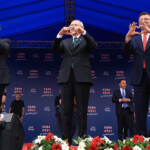‘As Kalın settles into his new role, commentators and people in diplomatic circles say his insider’s experience and wisdom could be eclipsed by his ambition and a potential willingness to hide hard, uncomfortable truths from his boss.’
Intelligence officers and diplomats often write tell-alls about their time in public service. A couple like Graham Greene and John le Carre have even turned out enduring classics.
But perhaps not since early modern Italy’s Niccolo Machiavelli has a senior statesman been as prolific a scholar as İbrahim Kalın, the new head of Turkey’s National Intelligence Organization (MİT). Kalın has regularly written hefty scholarly tomes on religion, philosophy and history—even while holding high-level government positions.
The longtime confidant of Pres. Recep Tayyip Erdoğan is gifted with superior analytical abilities and has over the years accumulated a sober understanding of Turkey’s troubles, challenges and limits.
Yet as Kalın settles into his new role, commentators and people in diplomatic circles say his insider’s experience and wisdom could be eclipsed by his ambition and a potential willingness to hide hard, uncomfortable truths from his boss.
“People who have dealt with him say he’s competent, and US officials say he is part of a small team that runs Turkish national security,” said one Washington-based analyst who has extensive knowledge of Turkish politics and who asked not to be named. “But he also goes along with Erdoğan, authoritarianism and all, and so he is what he is: a drifter with no clear morals.”
Kalın, 51, has taken an unlikely path to leading MİT, to which he was appointed shortly after Erdoğan’s re-election on May 28. Following a nearly nine-year stretch as a presidential spokesperson and senior advisor, Kalın takes the helm of the agency of roughly 8,000 employees at a moment when Turkey is seeking to redefine its role in the world and forge its own geostrategic axis.
“Türkiye is building its axis with determination,” he said during a speech in April. “Our membership in the NATO alliance and inclusion in Western security architecture are not obstacles for us to maintain good relations with Russia, China, Africa, the Middle East and other regions. It is already impossible to adhere to one pole in this multipolar world.”
Before entering public service, back in 2005, Kalın was a well-respected scholar teaching American students about Islam at the College of the Holy Cross in Worcester, Massachusetts, a rusting New England city.
Four years later he was in Ankara, briefing senior US officials about Turkey’s security concerns, according to a State Department cable obtained by the website, Wikileaks. Then last month, Kalın was in Vilnius, mingling with world leaders at a NATO summit during which he undoubtedly helped orchestrate negotiations between Turkey and its Western allies.
“His academic background serves as an asset,” says Sinan Ciddi, a Washington-based expert on Turkey and associate professor at Marine Corps University. “He understands how to construct an argument. He can think critically. He can imagine what the adversary may be thinking. He can plan for how the other side is going to respond.”
Around the world, most spy chiefs hail from the uniformed military or work their way up the ranks of their own services. Kalın’s predecessor and now foreign minister, Hakan Fidan, went to military school and served in the Turkish Armed Forces.
But Kalın emerged from the world of books and learning. After obtaining his bachelor’s degree in history at İstanbul University, he went abroad to study Islamic philosophy and history, first in Malaysia, where he obtained a master’s degree, and then in the US, where he was awarded a Ph.D. at George Washington University in 2002 under the guidance of Iranian-American scholar Seyyed Hossein Nasr, best known for his attempts to bring Islamic thinking into a modern context.
Kalın’s scholarly work has delved deeply into the metaphysical dimensions of medieval and early modern Islamic philosophy, especially the work of Mulla Sadra, a prominent Sufi philosopher. But his work often had a political edge that made it compatible with the Islamist leanings of Erdoğan’s Justice and Development Party (AKP).
He has long argued against Middle East pundits who cherry-picked quotes from a few Islamic scholars to depict the religion as inherently prone to violence. But Kalın also criticized extremists who did the same to justify political violence. He maintains that flawed scholarship has often served as an impediment to reconciliation between the West and Islam.
“Many Christian myths about the prophet of Islam, about the Quran, spread among the masses in Europe,” he said in a 2018 interview with TRT World. “And a very prominent European historian called it the age of ignorance because there was no contact to understand Muslim culture and society.”
After Erdoğan’s election to prime minister in 2003, Kalın’s pursuits assumed an even more political character. In 2006, he became a founder of the new government’s semi-official think tank, the Foundation for Political, Economic and Social Research or SETA.
In that role – and others later – observers have argued Kalın’s academic background gave him an advantage over career civil servants.
“As opposed to someone who has come up from the ranks, he could offer much better avenues to [achieve goals] not based on instinct but on strategy,” Ciddi told Turkey recap.
Adding to his mystique, Kalın is also an accomplished musician of traditional Sufi-influenced Turkish folk music and is so confident about his craft he puts his performances online.
“This guy is a very disciplined intellectual,” says one Turkish associate, who spoke on condition of anonymity. “He is highly capable—maybe the most intelligent and capable guy I’ve ever worked with.”
Kalın officially joined Erdoğan’s team in 2009 as head of public diplomacy and press operations. He frequently briefed international journalists and served for many years as a cordial and well-informed interlocutor between the press and the Erdoğan government. But he soon outgrew that role and assumed duties more akin to a senior national security advisor, grappling with matters that prepared him for his role as spy chief.
At MİT, Kalın’s main duties will be to oversee efforts to counter the activities of Islamist militants and Kurdish militants, both of which have engaged in terrorist operations targeting civilians in Turkey.
He must also keep an eye on potential disruptions from Syria and Iraq, where Turkish military operations continue, and the ambitions of neighboring Iran and Russia, both of which have allegedly conducted clandestine operations on Turkish soil. Western diplomats who have worked with him have described him as taking the threat of Moscow and Tehran seriously.
His predecessor, Fidan, handled several sensitive diplomatic portfolios, including improving frayed relations with both Israel and the United Arab Emirates. Kalın, too, played a key diplomatic role in smoothing relations between the White House and his sometimes acerbic boss, and will likely continue to use his excellent English and understanding of American culture and politics to help manage ties with Washington.
Indeed, Kalın visited Washington before the May elections and held a meeting with think tankers and policymakers about what the next Erdoğan term might look like. He was cordial, spoke in measured terms and avoided hyperbole, said a person who attended the gathering.
“He is one of the better positioned people to couch Erdoğan’s words in ways that policymakers in Washington can tolerate,” Ciddi said. “I’m not sure if the message gets across or if it is sellable, but at least he can put it out in a way that’s not bluster.”
While ordinarily soft-spoken and level-headed, Kalın has also been described as mercurial at moments, and has lost his temper during public events, including a live interview on DW’s Conflict Zone when he referenced Germany’s Nazi past to sidestep a hard line of questions.
Separately, in a Dec. 2022, Kalın cut an interview short after a Swedish journalist asked about allegations that criminals were sheltering in Turkey.
“That is the PKK speaking, that is FETÖ speaking,” he said, before walking off. “We have heard these claims many, many times. Don’t think that we will be intimidated by that kind of stuff. This is not honest journalism.”
Kalın is no newcomer to politics or matters of national security. He has spent perhaps 15 years as a member of Erdoğan’s most elite circle. But on key security matters, close observers wonder if his years around Erdoğan may have damaged his integrity, and whether when push comes to shove, he would choose to tailor his assessments to match his boss’s worldview and advance his career over Turkey’s interests.
“He has become corrupted,” one analyst told Turkey recap.
With Erdoğan advancing in age, Kalın could also potentially emerge as a powerful figure in determining Turkey’s future, one that many in the West may regard as more palatable than less cosmopolitan and more dogmatic alternatives within the AKP’s leadership.
He could use his time as head of MİT to possibly build up his own political base. Though he does not hail from the security services, his former associate said that Kalın over the years has won the respect of MİT’s rank-and-file.
“The culture of that place is very hierarchical,” he said. “And he was a respected person to begin with. It’s a good thing that people like him are in the Turkish government.”
This article was originally published by Turkey Recap.
The views and opinions expressed above are the author’s and do not represent those of the Free Turkish Press.


